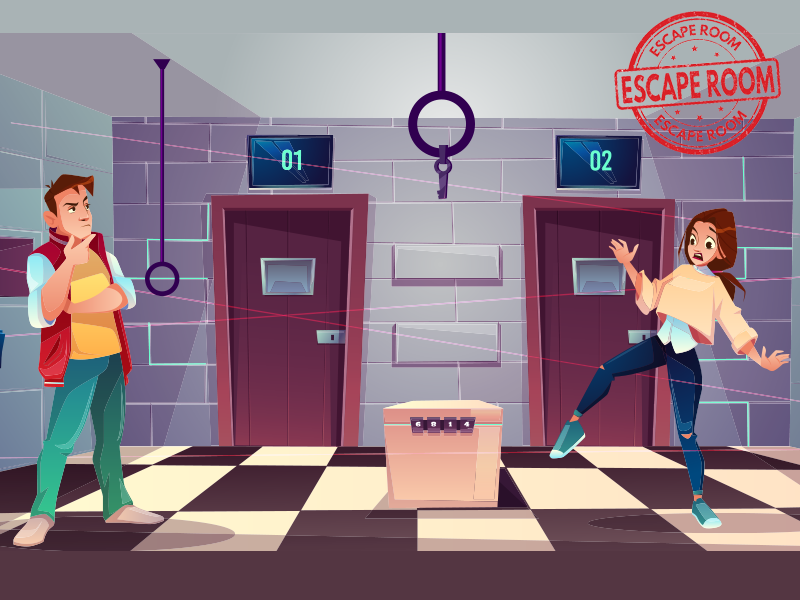Escape Room
A brief description of Escape Room:
 Escape Room is a team game where participants work together to solve puzzles and discover clues within a limited time to achieve a specific goal, often escaping from a room. In an educational context, Escape Room is time-constrained and problem-based. Teachers use them to create a discussion, cooperation and leadership. Escape Room is based on solving a problem, unlocking locks, and finding hidden clues to escape.
Escape Room is a team game where participants work together to solve puzzles and discover clues within a limited time to achieve a specific goal, often escaping from a room. In an educational context, Escape Room is time-constrained and problem-based. Teachers use them to create a discussion, cooperation and leadership. Escape Room is based on solving a problem, unlocking locks, and finding hidden clues to escape.
There are different ways how to create an Escape Room through various websites such as Google Forms, ThingLink, Genially (links to the websites are provided below).
1. Advantages of Educational Escape Room
Escape Room is a team activity which teachers should use in their practical teaching. It can be used in elementary school, middle school or high school. It is a great motivator for students in all ages, promoting both - enjoyment and learning. It allows students to develop cognitive thinking, collaboration, and various skills.

HOWEVER, WHY IS THIS ACTIVITY IMPORTANT?
LET'S TALK ABOUT ADVANTAGES OF EDUCATIONAL ESCAPE ROOM!
1. Create a positive environment - taste for learning
Escape rooms offer a unique and creative setting for enjoyable experiences. Learning in a fun environment is enjoyed by both students and teachers. In a classroom, students improve their cognitive skills through the game, which is fun and gives them motivation to learn more. Students share their knowledge with teachers and peers, which also supports better relations in the classroom. Using the escape room in school emphasizes the playful aspect of learning. It proves to be an effective method to create a positive environment for students and the class.
2. Collaboration and team work
In team games, children are motivated to communicate
and promote group cohesion. They push their limits to achieve a victory. It can
also help with improving relationships between students and making special
friendship connections. During the activity, they forget their differences and
have only one goal: to win. It can also help students discover each other’s
personalities and talents. Some students are better at leading; some of them
are more passive, but they must also help each other, which should improve
their communication and collaboration skills.
3. Develop different skills
In an Escape Room, students not only apply cognitive
skills but also improve new ones such as communication, leadership, and social
skills. Analyzing clues and solving puzzles demand analytical thinking. Many
puzzles provide a practical side of education—problem-solving. Develop
analytical, logical, and problem-solving skills. A good Escape Room
should have plenty of opportunities for students to analyze clues and use logic
and problem-solving skills to complete the challenges.
4. Learning is an active sport
The Escape Room is a perfect activity that can be used
in different schools and subjects. Students are excited to learn something new.
It can also help with active participation in the classroom and group. They
learn while having fun. Through the active learning, students also
develop critical thinking skills- they must solve the mysteries,
which require concentration and logical problem-solving skills.
5. Communication
In escape rooms, effective communication is crucial for success. Students often share observations, ideas, and solutions with each other. Communication in escape rooms involves verbal exchanges, active listening, and sometimes non-verbal cues. They must convey their thoughts clearly to ensure everyone is on the same page. This collaborative communication fosters teamwork and encourages individuals to contribute their unique perspectives. Additionally, escape rooms often impose time constraints, adding a sense of urgency. This element encourages participants to communicate efficiently, prioritize information, and delegate tasks effectively, contributing to an overall improvement in communication skills.
Resources:
Why educational escape rooms will benefit students in the long run. Brainy Actz Escape Rooms. (2017, July 31). https://www.brainyactzescaperooms.com/educational-escape-rooms-will-benefit-students-long-run/
Margot. (2022, September 8). 5 good reasons to organize an escape room at school!. Escape Kit. https://escape-kit.com/en/education/5-reasons-organize-school-escape-room/